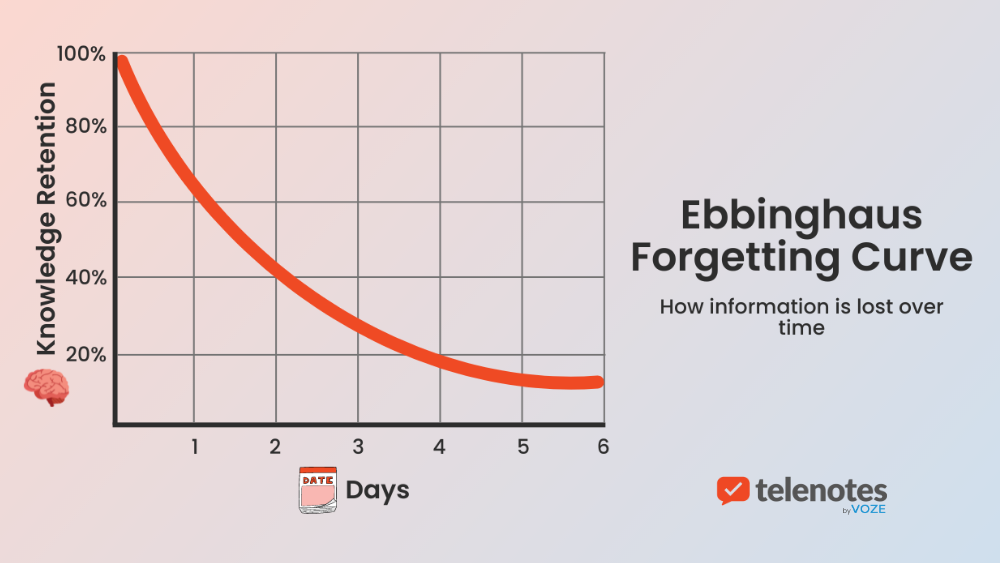Forgetting is Crippling Your Business
Whenever you get info from your sales team, you need it to be as clear and accurate as possible. And that clarity is critical for both you and your sales rep:
- For your rep: The better their report and notes after a sales call, the more organized their process will be and the easier it will be for them to close the deal.
- For you: The better your rep’s report, the easier it will be to identify what’s working (and what’s not)–which means the whole team stands to do better.
Any detail your representative gets and forgets to record and pass forward increases the risk that they’ll lose the sale.
Let’s be clear, I’m not suggesting your team in particular is forgetful. What I’m saying is that humans are forgetful.
The Forgetting Curve
Even back in the 19th century, scientists were trying to crack the secret of memory. Hermann Ebbinghaus came up with a handy graph to describe what he experienced in testing.

Now, while his findings did not illuminate exactly how the brain works, the Ebbinghaus Forgetting Curve is a great illustration of a common trend that plagues all of us: the more time that passes, the more we forget.
This has a profound effect on what your sales team can accomplish if you don’t organize things correctly.
The Way We Organize and Recall Information
A lot of teams make sure to have daily or weekly meetings. By the chart above, that can mean anything from a 33% retention down to a 25% retention of your sales reps’ daily activities by the time they make a report.
Think of it in terms of your chance of losing the sale: When your sales rep is recalling their sales call at the end of the day, they’ve already lost 67% of their memory of each sales call. Sometimes what’s forgotten are big details like the client wanting a price quote on a new product, and sometimes it’s smaller details like the buyer’s bosses’ name or something they said about the competition.
And to complicate things, sales reps make multiple sales calls per day. Jumbling sales calls together in a rep’s brain isn’t theoretical, it’s a reality.
Trying to sort out all of this information and battling our human trend toward forgetfulness is an uphill battle you’re simply not going to win.
How Do You Fix It?
The solution is simple: sales reps need to record key details after each sales call.
As we see it, you have two options:
- Your reps can open their laptops and log into your traditional CRM to type in all the info after each and every call
- Or you can use a CRM like Telenotes that acts as a virtual assistant, riding in the passenger seat throughout a sales rep’s day.

A virtual assistant CRM should be able to capture a rep talking, not typing, their call notes. The rep simply talks through what happened on the sales call, and then the virtual assistant CRM takes over to put all the relevant information in the appropriate fields, schedule follow-up appointments, email team members key info, and anything else that needs to be captured.
Shifting to a virtual assistant CRM makes it easier for your sales team to stay in the flow (no constant shifting from talking to typing) and it can speed up their data entry as well so you get the information you need to make the best decisions faster.
When it comes to battling our natural human tendency toward forgetfulness and making sure it’s not crippling your business, the answer is simple: reduce the time it takes to get the details recorded! No matter the tools you use to do that, make sure it’s fast, efficient, and easy for your team to get the details down before long hours mess with brief memories and you’ll see better results.







